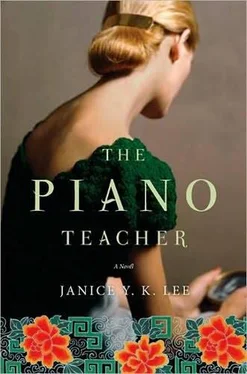“It looks so peaceful now, doesn’t it? ” Trudy says musingly. “The water in Hong Kong is a different color from anywhere else in the world-kind of a bottle green. I think it’s the mountains reflected in it.” She pauses. “It was quite red with blood just these few months ago. There are boats and bodies on the bottom of the sea, thick on it, I’m sure. It was shocking how quickly things looked normal again, how nature swallows up the aberrations.”
“What happened to Angeline’s house?”
“She’s managed to hang on to it, although I don’t know why she doesn’t come into town. This place is filled with Japanese army officials who have taken over the houses and I don’t see how it’s safe for her here. We have lunch every once in a while, Dominick, Angeline, and I. Try to pretend things are normal.”
“She’s all right, though? ”
“Not really. None of us are.”
They return to the hotel, where Trudy starts to pack his newly accumulated things into his suitcase.
“You’ll be popular when you get back.”
“We have to figure out a way to get supplies into the camps. The children need vitamins and protein.”
The phone rings.
“Victor,” says Trudy when she picks it up. Her voice is even.
“Yes, I did get it. Dommie gave it to me.” She pauses. “I know. I’m trying.” Another pause. “I’ll be in touch when I can, but please don’t call me about this again.” She hangs up the phone with a bang.
“Everything all right? ” Will asks.
“Watch me be frugal, Will,” Trudy says instead, ignoring his question. She starts to brew coffee on a small cooking plate. “This is my third go-around with these grounds. Have you ever seen anything so industrious? Aren’t you proud of me?”
They sip the hot, bitter drink without milk or sugar.
“Oh, I forgot. There’s something I wanted you to see.” She goes to the bedside table and pulls out a folded-up newspaper.
“This editorial was in that ridiculous paper on Valentine’s Day. Dommie wants me to frame it.” She reads, “ ‘The Eurasian is a problem in all British colonies. The term is applied loosely to the offspring of all mixed marriages and to their children, et cetera, et cetera. That Britain and some other of the Occidental powers chose to victimize the Eurasian rather than accept him and make use of his qualities is astonishing to students of the question. The Eurasian could be of great help to these powers, contributing valuable liaison between the ruling nation and the native population.’ ” She looks up. “Want to hear more? ”
“Can I see that?” She gives it to him. He scans it. A column of coarse intelligence.
“The funny thing is, I was talking about being Eurasian to Otsubo about a week before it came out.”
“Really?”
“Yes, really. Isn’t that interesting? I was telling him how when I was young, the other children would laugh and point at me, and on the streets, some Europeans would take my photograph as if I were some animal at the zoo.”
“It must have been difficult, but those people are just ignorant.”
“Turn the page,” she orders, gesturing to the paper.
“More of your influence? ”
“No, just another example of the absurdities we are subjected to every day. Do you see that piece about the houseflies, there? Where if you catch two taels of houseflies, you are entitled to a catty of rice if you bring it to a district bureau. And I’ve seen people carrying around these bundles of flies. It’s beyond. The Japanese are even more bizarre than the English. I’ve never imagined such a thing.”
Suddenly, she turns to him.
“Did you know I was eight when my mother disappeared? And eight is supposed to be such a lucky number for the Chinese. I’ve always wondered if it was because I was only half Chinese. And half of eight is four, which is a terrible number. You know, it means death.”
“What do you remember of her?”
“Bits and pieces. She didn’t go out much, because she didn’t fit in. She wasn’t English, so the English wouldn’t have anything to do with her, and the Chinese taitais certainly didn’t like her. And she wasn’t strong enough or confident enough to do anything about it. So she had very few friends and she was at home a lot, dressed beautifully with nothing to do but gossip with the servants. I suspect even they looked down on her. My father loved her, married her despite family disapproval, but he was so busy he didn’t have much time for her. She took me to the botanical gardens every once in a while, and to tea at the Gloucester. She wore gloves and a pillbox hat, and the straight skirts. She wanted me to be dressed properly as well. She was very beautiful. But I think she was sad.”
“You’ve never talked about her before.”
“I don’t remember that much.” She pauses. “I remember she told me about her childhood. She was very poor. She was funny about it too. She refused to eat soup, because to her that meant poverty. She had grown up in a house where they threw whatever little they had into a pot of water, sprinkled it liberally with salt, and called it a meal. She didn’t want me to grow up oblivious to our good fortune, but at the same time, I think she liked how the rich felt bulletproof-not her, obviously, but I think she liked that I might feel that way, but worried at the same time that it wouldn’t last. And she was right, wasn’t she? I’m not bulletproof. I’ve come a long way in the world, but the world has changed and I’m not sure anymore of what I am or what I can do.”
After love, they lie on the bed. She shifts away, suddenly shy, and stares at the ceiling. Words burst forth from her, as if unbidden, a confessional fountain she cannot stopper.
“I’ve always known, my love, that I was a chameleon. I was a terrible daughter because my father let me be one. He didn’t know what else to do with me, feeling so guilty I didn’t have a mother. And I was a good daughter when my mother was around. Because she couldn’t imagine anything else. And then when I was older, I was a different person every year, depending on who I was with. If I was with a scoundrel, then I became the type of woman that would be with a scoundrel. If I was with an artist, then I became a muse. And when I was with you, I was, for the first time, I’m sure people have told you, a decent human being. All Hong Kong wondered why someone like you would bother with someone like me. You know that, don’t you?”
She props herself up on an elbow, bronze hair falling across her shoulders.
“But now circumstances have changed, and I have reverted back to form and become a woman who is with somebody because it suits her situation and for no other reason than that simple and venal one. I’m no different from that Russian girl Tatiana, the one I pretend to despise. We’re more sisters than anything else. We recognize each other. I’m sure no one is surprised. Do you understand?”
“Melodrama,” he says. “You’re being absurd.” She is quiet, one hand nervously pulling her hair back from her face, the other fluttering around her mouth.
“Don’t ever say I didn’t tell you. I told you. You must know that I told you.”
The phone rings in the room.
Trudy picks it up and her mouth draws into a tense line.
“Yes, of course. Of course. I’ll see to it.”
She hangs up and turns to him, face unreadable.
“As it turns out, Otsubo is interested in meeting you. Intéressant , non?”
“Is it?”
“I don’t know what his intentions are. But we have to do what we’re told, don’t we? You don’t mind? It’s not as if we have much choice in the matter. Dommie will be there too.”
So that evening, after another silent, hot, soaking bath and having got dressed in silence-Trudy had brought some of Will’s old clothes and they had laughed to see how they hung loose on him, one spot of forced gaiety in a tense afternoon-they are seated in a small room of a restaurant in Tsim Sha Tsui, contemplating nuts in a small porcelain dish embellished with red dragons, as Trudy quaffs champagne at a rapid clip. Will lights a cigarette.
Читать дальше












